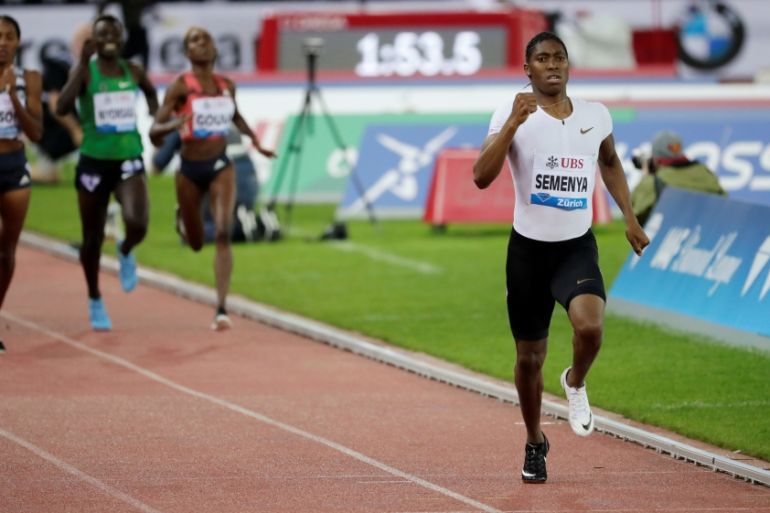Caster Semenya to run in Doha after controversial ruling
South African athlete to compete in 800m Diamond League race in Qatar before new testosterone rules come into effect.

South African runner Caster Semenya is set to compete in what could be her last 800-metre race before the International Association of Athletics Federations (IAAF) imposes controversial new rules limiting testosterone in female athletes.
The double Olympic champion, who has spent years trying to get the new IAAF rules thrown out, is scheduled to take part in the Diamond League meeting in Doha on Friday night, two days after losing her appeal against the regulations.
Keep reading
list of 4 itemsBritish runner completes challenge to run length of Africa
Nagham Abu Samra: Palestine karate champion, victim of Israel’s war on Gaza
Funeral held for world marathon record holder Kelvin Kiptum
In a landmark judgment on Wednesday, the Court of Arbitration for Sport (CAS) ruled that the IAAF rules medically limiting the naturally-occurring testosterone levels in female athletes running in events from 400m to the mile were necessary to ensure fair competition.
The rules, which come into force on May 8, apply to female or intersex athletes with differences of sexual development (DSD) who have a blood testosterone level of five nmol/L or above.
IAAF President Sebastian Coe called the ruling “very straightforward” and said there would be no delays in implementing the new rules, despite CAS concerns there was not enough evidence to apply them to the 1,500 metres and mile.
“Athletics has two classifications – age and gender,” Coe said at a press conference in Doha on Thursday. “We are fiercely protective about both and I’m really grateful that the court of arbitration has upheld that principle.”
Semenya will go up against European champion Lynsey Sharp, 2016 Olympic bronze medallist Margaret Wambui and silver medallist Francine Niyonsaba – who recently revealed she had similar difference in sexual development (DSD) characteristics to the South African.
Semenya’s personal best of 1:54.25 will make her the quickest in the upcoming meet, the first time she will compete over the distance in 2019.
‘Wounds of apartheid’
Athletics South Africa (ASA) said it was “deeply disappointed and profoundly shocked” at the CAS ruling, with both the sporting body and Semenya’s lawyers saying they could contest it.
|
|
“ASA respects the CAS decision and will now review the ruling and decide whether to consider the option of taking this matter to the Swiss Federal Tribunal within the 30 days as stipulated in the ruling,” the national governing body said in a statement.
“We are, however, reeling in shock at how a body held in high esteem like CAS can endorse discrimination without flinching.
ASA went on to compare the regulations with apartheid, where South African citizens were separated by racial group and afforded differing rights based on their skin colour.
Barring further legal action, Semenya will now be forced to medicate to suppress her testosterone levels if she wants to defend her world title in September in Doha, Qatar or look to compete in longer distances.
Meanwhile fans are urging the runner not to quit after she posted a cryptic message, hinting retirement.
“Knowing when to walk away is wisdom. Being able to is courage. Walking away with your head held high is dignity,” Semenya posted on Twitter.
🤷♂️ pic.twitter.com/gCzZap740L
— Caster Semenya (@caster800m) May 2, 2019
Some former athletes have expressed sympathy for the runner, including four-time gold medallist Michael Johnson.
“While it’s no fault of Caster Semenya’s, unfortunately for her, she will have to make a decision to either start taking the medication to reduce her testosterone levels or not be allowed to compete and it’s a difficult situation to be in,” he said.
“But I think the decision was based on the fairness of sports so that there is a level playing-field for all of the athletes in any given race,” Johnson added.